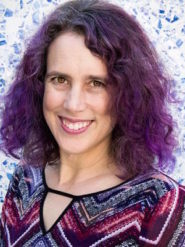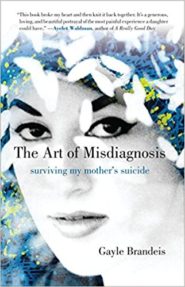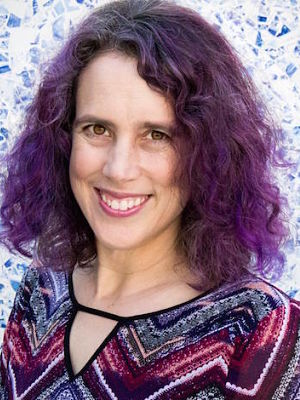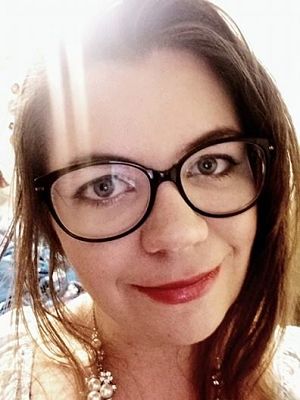Litdish: Gayle Brandeis, Author
Welcome to our new Amuse-Bouche occasional series, Litdish. This is a solicited series of interviews with writers and artists in conversation with our staff about literature, art, social justice, and community activism. Please enjoy. ~The Editors

Gayle Brandeis is a poet, writer, and activist. She is the author of the poetry collections The Selfless Bliss of the Body and Dictionary Poems, as well as a craft book Fruitflesh: Seeds of Inspiration for Women Who Write. Her novels include Delta Girls: A Novel, Self Storage, and My Life with the Lincolns. Her first novel, The Book of Dead Birds, won The Bellwether Prize for Fiction of Social Engagement. Brandeis’s work has appeared in numerous publications including Salon and The Nation. Her recent essay “My Shadow Son: A stranger insisted he was my son for over a decade” has been featured in The Washington Post, Independent, and The Chicago Tribune. Her new memoir, The Art of Misdiagnosis: Surviving My Mother’s Suicide, is a raw and poetic exploration of trauma and healing. Currently, Brandeis teaches writing at Antioch University Los Angeles and Sierra Nevada College. She is the editor of Tiferet Journal and Lady/Liberty/Lit, as well as the 2018 judge for Lunch Ticket’s Diana Woods Memorial award for nonfiction writing. In December 2017, I had the opportunity to meet up with Brandeis in Los Angeles to talk about the intersections of life and writing. Here is an excerpt of our conversation.
Interviewed by Kori Kessler and edited for clarity.
Kori Kessler: You’re the next judge for Lunch Ticket’s Diana Woods Memorial award for nonfiction writing and a lot of the submissions explore trauma. I was wondering how creative nonfiction, as a genre, helps in the healing process when it comes to going through trauma?
Gayle Brandeis: It helps in so many ways. For me, it allowed me to dive as deeply as possible into my own story. I have a tendency to shy away from hard stuff and I told myself I really need to go there and just swim around and explore this as thoroughly as I can so I can try to come to some sort of understanding about what happened. So it allowed me to immerse myself in my pain as a way of moving through my pain. But at the same time, it gave me some detachment from my own story which was really helpful because I had to see it clearly from within and without, and stepping back from it gave me more compassion for myself in a way and allowed me to see things more clearly.
The writing does help me get closer to my own story and step back from my own story, so there was this kind of double consciousness that allowed me to see things in a fresh way, it was so deeply cathartic. The first draft especially was deeply cathartic and then the revision was when I was able to gain the detachment. I started seeing my story as art and not just catharsis. So it became both catharsis and art.
KK: Is that [artful presentation] what you look for in other creative nonfiction?
GB: I think so; I certainly want to see someone approach their story in an artful way so it’s not just like reading someone’s journal. Like seeing someone grappling with their story and transforming it into art.
KK: Do you feel that creative nonfiction can help in the healing process that we are going to have to go through as a nation to help us navigate the current political situations and powers?
GB: I think it can be a very important part of the healing process. I know that reading think pieces by other people, especially if they are very rooted in the writer’s own experience, it helps me understand what’s going on. And I think there is so much we as a nation need to confront right now and process, and I think our voices can help pull each other forward. I know that for myself, I often don’t really know what I know and understand until I write it down. And I’ve heard other writers say something very similar. So writing can definitely help us to grapple with the confusion and chaos of this ridiculous world. And our voices can really be hands reaching out to each other saying you are not alone. Let’s join in solidarity.
Our individuality is so important, but when we each raise our voices we can create this collective chorus that I think will help change the cultural story. When we change the story, we change the culture.
We see that happening with the #metoo movement, with not just women, with people giving voice to things that have been kept silent. When we start telling these stories, things change. I think writing will be vitally crucial during this time.
KK: Do you think that creative nonfiction as a genre is going to help bridge gaps in polar ideals?
 GB: I hope so. I feel like it has to help eventually, but our culture is divided into such polar camps. I don’t really know what it’s going to take to build that bridge. I do have faith in deeply human stories, that beneath all this ideology we all have heart beats, we all can enjoy a ripe plum. There are these simple basic human experiences, giving birth, breathing, our loved ones. If we can meet on that basic human level, which we can do through our stories, I think that provides the greatest opportunity for a bridge. But it’s scary when we come to our stories with such different ideologies and people have a different idea of what truth is. It can be tricky, but I still have faith in the deeply human story.
GB: I hope so. I feel like it has to help eventually, but our culture is divided into such polar camps. I don’t really know what it’s going to take to build that bridge. I do have faith in deeply human stories, that beneath all this ideology we all have heart beats, we all can enjoy a ripe plum. There are these simple basic human experiences, giving birth, breathing, our loved ones. If we can meet on that basic human level, which we can do through our stories, I think that provides the greatest opportunity for a bridge. But it’s scary when we come to our stories with such different ideologies and people have a different idea of what truth is. It can be tricky, but I still have faith in the deeply human story.
KK: How has your writing process changed throughout the years and has this current memoir changed your writing process at all?
GB: Yeah. I’ve been writing since I was four, so writing has always been a huge part of my life. So my process has definitely changed over the years. I feel like writing this book has been liberating in so many ways because I think that in writing fiction, without realizing it, I was kind of trying to work some stuff out subconsciously of my own life. And being able to face my own story head on through this memoir was really important to me. I’m someone who has not been very forthcoming with my own story. I’ve kept a lot hidden and so to be able to be honest about my own life has made me feel just so much freer as a human being. I feel like I can speak more freely; I can move more freely through the world because I’m hiding less. And that make me feel braver as a writer across all genres. I feel like I can just kind of bust forth with whatever I need to write on.
KK: Which non-writing related aspect of your life influences your writing?
GB: I would have to say that dance and writing are really interwoven for me; those have been my two main modes of expression my whole life. And I don’t dance as often as I’d like these days but when I do, it feels so good and I just like to cut as loose as possible and I definitely dance as if no one is watching. The freedom that I feel when I am dancing is something that I like to capture every day. So just feeling completely at home in my skin when I dance, which I don’t always do as much in my life as I want to, I definitely want to translate that into my writing as well. Feeling fully my body, fully alive, fully open to the moment and a little bit wild.
KK: Do you have any advice for writers of creative nonfiction?
GB: I go back to this TED talk by Brené Brown on vulnerability. She talks about how she discovered that the original definition of the word courage is to tell one’s story with all one’s heart and I think that is the courage we need when we tell our own stories, to jump into it with our whole heart, our body, don’t forget your body as you are writing. And our experiences are all right there inside our skin so tap into that. Be as brave as you can be.
Finding that radar that tells us whether we need space or a kick in the pants can be tricky to find, but just keep coming back to that sense of courage. I think that is what readers are looking for.
I know there are times when we are not quite ready to tell certain things. We have to develop some sort of inner radar that tells us when we need to listen and give ourselves that time and space so we can be ready later when we need to give ourselves a bit of a nudge.
KK: What is the best writing advice you’ve ever received, and what has been the worst?
GB: I always go back to Anne Lamott’s “Shitty First Drafts.” I think that was so liberating and that has been something reiterated by a lot of writing teachers. Just the importance of giving ourselves permission to write the most horrible stuff. I’ve been a perfectionist when I was younger. I did some child modeling as a kid, which was not well-suited for my temperament. I was so shy. I was given this job where I had to be at trade shows where I was modeling this very rudimentary early classroom computer called the System 80, and someone asked me to push the wrong answer to see what it would do. I couldn’t do it. I started crying and I had to be carried away from the demonstration by my mom because I was sobbing because I could not push the wrong answer. I was this awful perfectionist.
Luckily I’ve let go of a lot of that and some of that has been through this advice of just writing shitty first drafts; just giving yourself permission to play, to explore, to be messy, to not worry if it’s right or okay, that you can make it better through revision. That has been advice that has been deeply, deeply helpful.
As for the worst advice, I can’t think of anything specific but anytime advice is really prescriptive, and says that you always have to do this or never have to do that, I bristle against that. I bristle against absolutes in terms of writing advice because I think that we each have to find our own best pathways which can be very different from someone else. My feeling is when someone says to never do something, I want to do it.
KK: What are you currently reading?
GB: I am kind of dipping in and out of a few different books right now, and I’m loving all of them. I’m reading Lydia Yuknavitch’s The Misfits Manifesto, which is based on her TED talk, and it’s just this inspiring book about the power of being a misfit. I have felt like a misfit in many ways in my life and I just love her book. I am also reading this really interesting book of essays called Circadian by Chelsey Clammer which was recommended to by a Laraine Herring, a dear friend whom I graduated with. There’s a really interesting form in this book. It’s very free in terms of possibility for the essay. And I also started reading Her Body and Other Parties by Carmen Maria Machado a short story collection which is super freeing as well.
KK: Do you have a favorite TED Talk?
GB: I love Lydia Yuknavitch’s TED Talk. I love so many. They are a great source of inspiration.


 Kori Kessler has work published in Tiferet Journal. Currently, she attends Antioch University Los Angeles and is co-associate managing editor of Lunch Ticket. She lives with her three dogs Ginsberg, Elliot, and Stella.
Kori Kessler has work published in Tiferet Journal. Currently, she attends Antioch University Los Angeles and is co-associate managing editor of Lunch Ticket. She lives with her three dogs Ginsberg, Elliot, and Stella.


